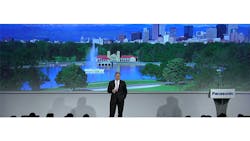Denver's Becoming a 'Smart City' with Help from Panasonic
Denver will become a smart city by improving energy efficiency, water conservation, public safety, healthcare and other public services. And Panasonic Corp. of North American will provide the technology to help the city achieve its goals.
“We want to make it a smarter, more sustainable place to live, to travel, and to work,” said Joseph Taylor, CEO of Panasonic North America, at CES last week.
Panasonic’s CityNow approach, which is based on the company’s experience in smart city planning and integration around the world, will be the linchpin of the company’s initiatives in the Denver metro area.
“This exciting, new partnership between Panasonic, the city and other Denver entities will connect people to the city services they need through real-time information and technology,” said Denver Mayor Michael B. Hancock. “That real-time information will work to enhance Denver services while creating more equity, freedom and access to choices that will allow our community as a whole to live better, easier lives.”
The application of smart technologies to the city’s infrastructure, including in and around Denver International Airport, is expected to put more real-time information on city services in the hands of the community. Smart technologies embedded in the city’s infrastructure will enable people to have effortless access to information about services, including utilities and mass transit. In addition, this responsive infrastructure will transform smart urban infrastructure like street lighting and energy systems to dynamically sense and respond to the presence of people and deliver services as needed.
Towards this goal, Xcel Energy has presented a project to build a microgrid with contributions from Panasonic and Denver International Airport that will demonstrate the use of Solar Photo Voltaic and Lithium Ion storage batteries working together. The microgrid, made up of a 1.3MW AC Solar Carport System and a 1MW/2MWh Battery Storage System, if approved, will be “the most comprehensive project of this type in Colorado history and the first with actual customer participation in a real-world environment,” according to Alice K. Jackson, regional vice president for rates and regulatory affairs at Xcel Energy.
Panasonic is also working with Aviation Station North Metropolitan District No. 1, developer L.C. Fulenwider, Inc. and Denver International Airport to pilot a system of “smart” LED Street lighting at the Peña Station NEXT development district near the Panasonic Enterprise Solutions hub that is now under construction. The system is designed to save energy, optimize usage and bring new video analytics technology to streets that can support parking management, traffic analysis, security, and many other potential future services.
Smart technologies will also be used to contribute to community health and well-being. The Peña Station NEXT Health and Wellness Center, supported by Panasonic’s On4Care Remote Health Care solution will enable the commercial and residential population to access health and wellness activities ranging from fitness and health-related education to traditional healthcare and alternative medicine services. Patients with chronic illnesses will also be able to benefit from in-home biometric readings and advanced, real-time, patient-doctor interactions while in the comfort of their own homes. On4Care has potential transformational implications for the delivery of health care services in an urban environment.
About the Author
IW Staff
Find contact information for the IndustryWeek staff: Contact IndustryWeek
